Advances on the Photoperiodic Regulation of Plant Flowering: A Bibliometric Study
Abstract
1. Introduction
2. Methods
2.1. Methods
2.2. Data Retrieval
3. Results and Discussion
The Publication Trends
3.2. Author Contributions and Collaboration
3.2.1. Author Characteristics
3.2.2. The Most Productive and Influential Institutions
3.2.3. The Most Productive and Influential Countries/Territories
3.3. Co-Citation Analysis
3.3.1. Journal Co-Citation Analysis
3.3.2. Literature Co-Citation Analysis
3.4. Subject Category Distribution for the Literature
3.5. Keyword Co-Occurrence Analysis
3.6. Research Frontier Identification
4. Conclusions
- (1)
- The number of relevant academic articles published annually in the field of photoperiodic regulation of plant flowering continues to rise, reflecting the growing research interest and commitment in the field. Notably, an increasing number of researchers and teams are joining together to form a global research network that crosses national and institutional boundaries, collectively promoting knowledge sharing and innovation.
- (2)
- Further analyzing the highly cited papers, it can be observed that several core research hotspots have continued to receive attention in the past: flowering gene networks and signaling pathways in the photoperiodic pathway, systems biology and multi-omics, environmental adaptation studies, and cross-species comparisons. These research hotspots also foreshadow future research trends.
- (3)
- Among the research frontiers, nine key research clusters can be identified, focusing on the research hotspots in the field of photoperiod regulation of plant flowering. These clusters together constitute a comprehensive framework for research on photoperiod-regulated plant flowering. They shed light on scientific issues ranging from basic biological mechanisms to environmental adaptations and reflect the current interests of the academic community.
Supplementary Materials
Author Contributions
Funding
Data Availability Statement
Acknowledgments
Conflicts of Interest
References
- Teixeira, R.T. Distinct Responses to Light in Plants. Plants 2020, 9, 894. [Google Scholar] [CrossRef] [PubMed]
- Santin, M.; Ranieri, A.; Castagna, A. Anything New under the Sun? An Update on Modulation of Bioactive Compounds by Different Wavelengths in Agricultural Plants. Plants 2021, 10, 1485. [Google Scholar] [CrossRef] [PubMed]
- Gendron, J.M.; Staiger, D. New Horizons in Plant Photoperiodism. Annu. Rev. Plant Biol. 2023, 74, 481–509. [Google Scholar] [CrossRef] [PubMed]
- Chen, M.; Chory, J.; Fankhauser, C. Light signal transduction in higher plants. Annu. Rev. Genet. 2004, 38, 87–117. [Google Scholar] [CrossRef]
- Kami, C.; Lorrain, S.; Hornitschek, P.; Fankhauser, C. Light-regulated plant growth and development. Curr. Top. Dev. Biol. 2010, 91, 29–66. [Google Scholar]
- Hjertaas, A.C.; Preston, J.C.; Kainulainen, K.; Humphreys, A.M.; Fjellheim, S. Convergent evolution of the annual life history syndrome from perennial ancestors. Front. Plant Sci. 2023, 13, 1048656. [Google Scholar] [CrossRef]
- Bu, T.; Lu, S.; Wang, K.; Dong, L.; Li, S.; Xie, Q.; Xu, X.; Cheng, Q.; Chen, L.; Fang, C.; et al. A critical role of the soybean evening complex in the control of photoperiod sensitivity and adaptation. Proc. Natl. Acad. Sci. USA 2021, 118, e2010241118. [Google Scholar] [CrossRef] [PubMed]
- Chatterton, N.J.; Silvius, J.E. Photosynthate partitioning into starch in soybean leaves: I. Effects of Photoperiod versus Photosynthetic Period Duration. Plant Physiol. 1978, 64, 749–753. [Google Scholar] [CrossRef]
- Griffin, J.H.C.; Prado, K.; Sutton, P.; Toledo-Ortiz, G. Coordinating light responses between the nucleus and the chloroplast, a role for plant cryptochromes and phytochromes. Physiol. Plant. 2020, 169, 515–528. [Google Scholar] [CrossRef] [PubMed]
- Balcerowicz, M.; Mahjoub, M.; Nguyen, D.; Lan, H.; Stoeckle, D.; Conde, S.; Jaeger, K.E.; Wigge, P.A.; Ezer, D. An early-morning gene network controlled by phytochromes and cryptochromes regulates photomorphogenesis pathways in Arabidopsis. Mol. Plant 2021, 14, 983–996. [Google Scholar] [CrossRef]
- Montgomery, B.L. Right place, right time: Spatiotemporal light regulation of plant growth and development. Plant Signal. Behav. 2008, 3, 1053–1060. [Google Scholar] [CrossRef] [PubMed]
- Putterill, J.; Laurie, R.; Macknight, R. It’s time to flower: The genetic control of flowering time. BioEssays News Rev. Mol. Cell. Dev. Biol. 2004, 26, 363–373. [Google Scholar] [CrossRef] [PubMed]
- Lagercrantz, U. At the end of the day: A common molecular mechanism for photoperiod responses in plants? J. Exp. Bot. 2009, 60, 2501–2515. [Google Scholar] [CrossRef] [PubMed]
- Takagi, H.; Hempton, A.K.; Imaizumi, T. Photoperiodic flowering in Arabidopsis: Multilayered regulatory mechanisms of CONSTANS and the florigen FLOWERING LOCUS T. Plant Commun. 2023, 4, 100552. [Google Scholar] [CrossRef] [PubMed]
- Osnato, M.; Cota, I.; Nebhnani, P.; Cereijo, U.; Pelaz, S. Photoperiod control of plant growth: Flowering time genes beyond flowering. Front. Plant Sci. 2022, 12, 805635. [Google Scholar] [CrossRef] [PubMed]
- Soto-Cerda, B.J.; Aravena, G.; Cloutier, S. Genetic dissection of flowering time in flax (Linum usitatissimum L.) through single- and multi-locus genome-wide association studies. Mol. Genet. Genom. 2021, 296, 877–891. [Google Scholar] [CrossRef] [PubMed]
- Petit, J.; Salentijn, E.M.J.; Paulo, M.J.; Denneboom, C.; Trindade, L.M. Genetic architecture of flowering time and sex determination in hemp (Cannabis sativa L.): A genome-wide association study. Front. Plant Sci. 2020, 11, 569958. [Google Scholar] [CrossRef] [PubMed]
- Bavykina, M.; Kostina, N.; Lee, C.R.; Schafleitner, R.; Bishop-von Wettberg, E.; Nuzhdin, S.V.; Samsonova, M.; Gursky, V.; Kozlov, K. Modeling of Flowering Time in Vigna radiata with Artificial Image Objects, Convolutional Neural Network and Random Forest. Plants 2022, 11, 3327. [Google Scholar] [CrossRef] [PubMed]
- Kozlov, K.; Sokolkova, A.; Lee, C.R.; Ting, C.T.; Schafleitner, R.; Bishop-von Wettberg, E.; Nuzhdin, S.; Samsonova, M. Dynamical climatic model for time to flowering in Vigna radiata. BMC Plant Biol. 2020, 20 (Suppl. S1), 202. [Google Scholar] [CrossRef]
- Serrano-Bueno, G.; Sánchez de Medina Hernández, V.; Valverde, F. Photoperiodic Signaling and Senescence, an Ancient Solution to a Modern Problem? Front. Plant Sci. 2021, 12, 634393. [Google Scholar] [CrossRef]
- DeHaan, L.; Larson, S.; López-Marqués, R.L.; Wenkel, S.; Gao, C.; Palmgren, M. Roadmap for Accelerated Domestication of an Emerging Perennial Grain Crop. Trends Plant Sci. 2020, 25, 525–537. [Google Scholar] [CrossRef] [PubMed]
- Jung, C.; Müller, A.E. Flowering time control and applications in plant breeding. Trends Plant Sci. 2009, 14, 563–573. [Google Scholar] [CrossRef]
- Burlyaeva, M.; Vishnyakova, M.; Gurkina, M. Collections of Mungbean [Vigna radiata) (L.) R. Wilczek] and urdbean [V. mungo (L.) Hepper] in Vavilov Institute (VIR): Traits diversity and trends in the breeding process over the last 100 years. Genet. Resour. Crop Evol. 2019, 66, 767–781. [Google Scholar] [CrossRef]
- He, Y.; Matthews, M.L. Seasonal climate conditions impact the effectiveness of improving photosynthesis to increase soybean yield. Field Crop. Res. 2023, 296, 108907. [Google Scholar] [CrossRef] [PubMed]
- DeHaan, L.R.; Anderson, J.A.; Bajgain, P.; Basche, A.; Cattani, D.J.; Crain, J.; Crews, T.E.; David, C.; Duchene, O.; Gutknecht, J.; et al. Discussion: Prioritize perennial grain development for sustainable food production and environmental benefits. Sci. Total Environ. 2023, 895, 164975. [Google Scholar] [CrossRef]
- Hamann, E.; Denney, D.; Day, S.; Lombardi, E.; Jameel, M.I.; MacTavish, R.; Anderson, J.T. Review: Plant eco-evolutionary responses to climate change: Emerging directions. Plant Sci. Int. J. Exp. Plant Biol. 2021, 304, 110737. [Google Scholar] [CrossRef]
- Tan, H.; Li, J.; He, M.; Li, J.; Zhi, D.; Qin, F.; Zhang, C. Global evolution of research on green energy and environmental technologies: A bibliometric study. J. Environ. Manag. 2021, 297, 113382. [Google Scholar] [CrossRef]
- Waltman, L.; Van Eck, N.J.; Noyons, E.C.M. A unified approach to mapping and clustering of bibliometric networks. J. Informetr. 2010, 4, 629–635. [Google Scholar] [CrossRef]
- Chen, C. CiteSpace II: Detecting and visualizing emerging trends and transient patterns in scientific literature. J. Am. Soc. Inf. Sci. Technol. 2006, 57, 359–377. [Google Scholar] [CrossRef]
- Mongeon, P.; Paul-Hus, A. The journal coverage of Web of Science and Scopus: A comparative analysis. Scientometrics 2016, 106, 213–228. [Google Scholar] [CrossRef]
- Brambilla, V.; Gomez-Ariza, J.; Cerise, M.; Fornara, F. The importance of being on time: Regulatory networks controlling photoperiodic flowering in cereals. Plant Sci. 2017, 8, 665. [Google Scholar] [CrossRef]
- Oakenfull, R.J.; Davis, S.J. Shining a light on the Arabidopsis circadian clock. Plant Cell Environ. 2017, 40, 2571–2585. [Google Scholar] [CrossRef]
- Khan, I.; Lei, H.; Khan, A.; Muhammad, I.; Javeed, T.; Khan, A.; Huo, X. Yield gap analysis of major food crops in Pakistan: Prospects for food security. Environ. Sci. Pollut. Res. 2021, 28, 7994–8011. [Google Scholar] [CrossRef]
- Holcombe, A.O.; Kovacs, M.; Aust, F.; Aczel, B. Documenting contributions to scholarly articles using CRediT and tenzing. PLoS ONE 2020, 15, e0244611. [Google Scholar] [CrossRef]
- Chen, C.; Song, M. Visualizing a field of research: A methodology of systematic scientometric reviews. PLoS ONE 2019, 14, e0223994. [Google Scholar] [CrossRef]
- Yu, B.; He, X.; Tang, Y.; Chen, Z.; Zhou, L.; Li, X.; Zhang, C.; Huang, X.; Yang, Y.; Zhang, W.; et al. Photoperiod controls plant seed size in a CONSTANS-dependent manner. Nat. Plants 2023, 9, 343–354. [Google Scholar] [CrossRef]
- Tan, H.; Sun, J.; Wang, W.; Zhu, C. User Experience & Usability of Driving: A bibliometric analysis of 2000–2019. Int. J. Hum.–Comput. Interact. 2021, 37, 297–307. [Google Scholar]
- Jiang, S.; Liu, Y.; Zheng, H.; Zhang, L.; Zhao, H.; Sang, X.; Xu, Y.; Lu, X. Evolutionary patterns and research frontiers in neoadjuvant immunotherapy: A bibliometric analysis. Int. J. Surg. 2023, 109, 2774–2783. [Google Scholar] [CrossRef] [PubMed]
- Wang, X.; Wang, C.; Han, W.; Sun, J.; Hui, Z.; Lei, S.; Wu, H.; Liu, X. Global status of research on gastrointestinal cancer patients’ quality of life: A bibliometric and visual analysis from 2003 to 2023. Heliyon 2023, 10, e23377. [Google Scholar] [CrossRef]
- Abe, M.; Kobayashi, Y.; Yamamoto, S.; Daimon, Y.; Yamaguchi, A.; Ikeda, Y.; Ichinoki, H.; Notaguchi, M.; Goto, K.; Araki, T. FD, a bZIP protein mediating signals from the floral pathway integrator FT at the shoot apex. Science 2005, 309, 1052–1056. [Google Scholar] [CrossRef]
- Andrés, F.; Coupland, G. The genetic basis of flowering responses to seasonal cues. Nat. Rev. Genet. 2012, 13, 627–639. [Google Scholar] [CrossRef] [PubMed]
- Valverde, F.; Mouradov, A.; Soppe, W.; Ravenscroft, D.; Samach, A.; Coupland, G. Photoreceptor regulation of CONSTANS protein in photoperiodic flowering. Science 2004, 303, 1003–1006. [Google Scholar] [CrossRef] [PubMed]
- Doi, K. Ehd1, a B-type response regulator in rice, confers short-day promotion of flowering and controls FT-like gene expression independently of Hd1. Genes Dev. 2004, 18, 926–936. [Google Scholar] [CrossRef]
- Imaizumi, T.; Schultz, T.F.; Harmon, F.G.; Ho, L.A.; Kay, S.A. FKF1 F-box protein mediates cyclic degradation of a repressor of CONSTANS in Arabidopsis. Science 2005, 309, 293–297. [Google Scholar] [CrossRef] [PubMed]
- Kumar, S.V.; Lucyshyn, D.; Jaeger, K.E.; Alós, E.; Alvey, E.; Harberd, N.P.; Wigge, P.A. Transcription factor PIF4 controls the thermosensory activation of flowering. Nature 2012, 484, 242–245. [Google Scholar] [CrossRef] [PubMed]
- Lee, J.; Lee, I. Regulation and function of SOC1, a flowering pathway integrator. J. Exp. Bot. 2010, 61, 2247–2254. [Google Scholar] [CrossRef] [PubMed]
- Tamaki, S.; Matsuo, S.; Wong, H.L.; Yokoi, S.; Shimamoto, K. Hd3a protein is a mobile flowering signal in rice. Science 2007, 316, 1033–1036. [Google Scholar] [CrossRef] [PubMed]
- Hayama, R.; Yokoi, S.; Tamaki, S.; Yano, M.; Shimamoto, K. Adaptation of photoperiodic control pathways produces short-day flowering in rice. Nature 2003, 422, 719–722. [Google Scholar] [CrossRef] [PubMed]
- Yanovsky, M.J.; Kay, S.A. Molecular basis of seasonal time measurement in Arabidopsis. Nature 2002, 419, 308–312. [Google Scholar] [CrossRef]
- Dalmaijer, E.S.; Nord, C.L.; Astle, D.E. Statistical power for cluster analysis. BMC Bioinform. 2022, 23, 205. [Google Scholar] [CrossRef]
- Lin, K.-H.; Chen, Y.-C.; Wu, Q.; Lin, H.-H. Effects of red and blue light ratio on the morphological traits and flower sex expression in cucurbita moschata duch. Not. Bot. Horti Agrobot. Cluj-Napoca 2023, 51, 13123. [Google Scholar]
- Trivellini, A.; Toscano, S.; Romano, D.; Ferrante, A. LED Lighting to Produce High-Quality Ornamental Plants. Plants 2023, 12, 1667. [Google Scholar] [CrossRef] [PubMed]
- Kharshiing, E.V.; Mawphlang, O.I.L.; Lama, V.; Bhattacharjee, R.; Sahoo, L. Manipulation of light environment for optimising photoreceptor activity towards enhancing plant traits of agronomic and horticultural importance in crops. J. Hortic. Sci. Biotechnol. 2022, 97, 535–551. [Google Scholar] [CrossRef]
- Bhagooli, R.; Mattan-Moorgawa, S.; Kaullysing, D.; Louis, Y.D.; Gopeechund, A.; Ramah, S.; Soondur, M.; Pilly, S.S.; Beesoo, R.; Wijayanti, D.P.; et al. Chlorophyll fluorescence—A tool to assess photosynthetic performance and stress photophysiology in symbiotic marine invertebrates and seaplants. Mar. Pollut. Bull. 2021, 165, 112059. [Google Scholar] [CrossRef] [PubMed]
- Newcomb, M.; Shakoor, N. Nighttime chlorophyll fluorescence imaging of dark-adapted plants using a robotic field phenotyping platform. Methods Mol. Biol. 2022, 2539, 213–220. [Google Scholar] [PubMed]
- Turck, F.; Fornara, F.; Coupland, G. Regulation and identity of florigen: FLOWERING LOCUS T moves center stage. Annu. Rev. Plant Biol. 2008, 59, 573–594. [Google Scholar] [CrossRef] [PubMed]
- Searle, I.; He, Y.; Turck, F.; Vincent, C.; Fornara, F.; Kröber, S.; Amasino, R.A.; Coupland, G. The transcription factor FLC confers a flowering response to vernalization by repressing meristem competence and systemic signaling in Arabidopsis. Genes Dev. 2006, 20, 898–912. [Google Scholar] [CrossRef]
- Kromdijk, J.; Głowacka, K.; Leonelli, L.; Gabilly, S.T.; Iwai, M.; Niyogi, K.K.; Long, S.P. Improving photosynthesis and crop productivity by accelerating recovery from photoprotection. Science 2016, 354, 857–861. [Google Scholar] [CrossRef] [PubMed]
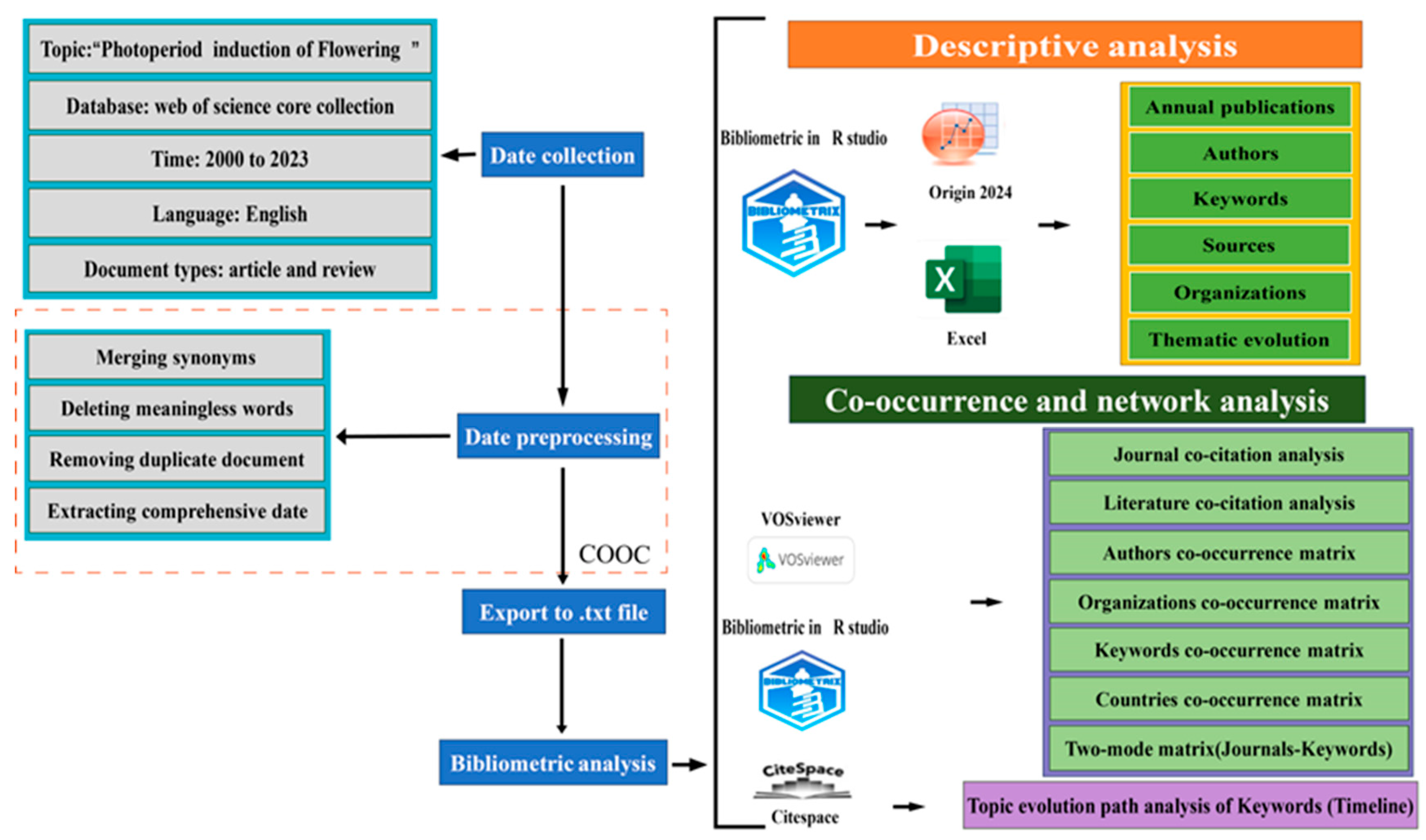
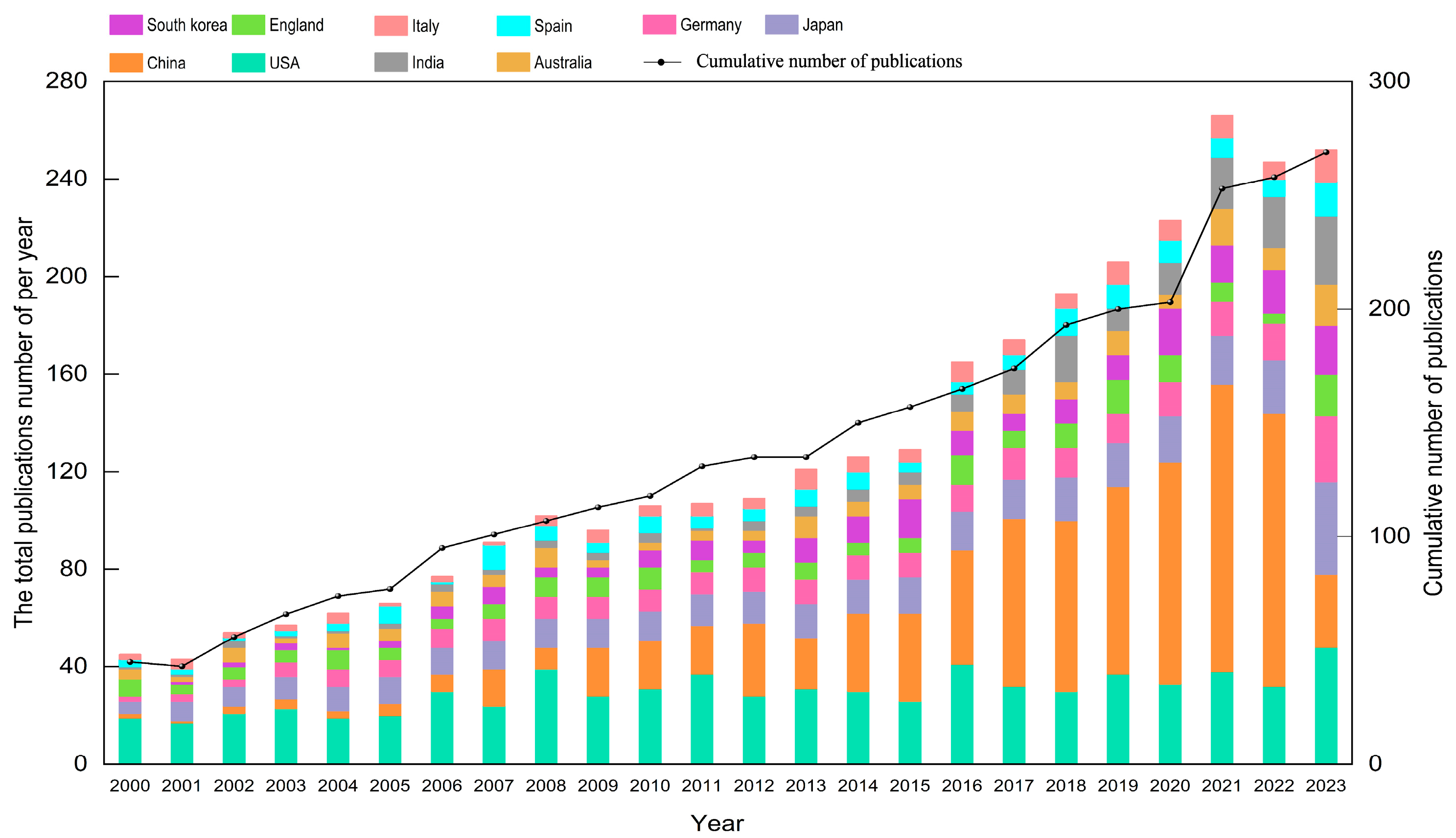
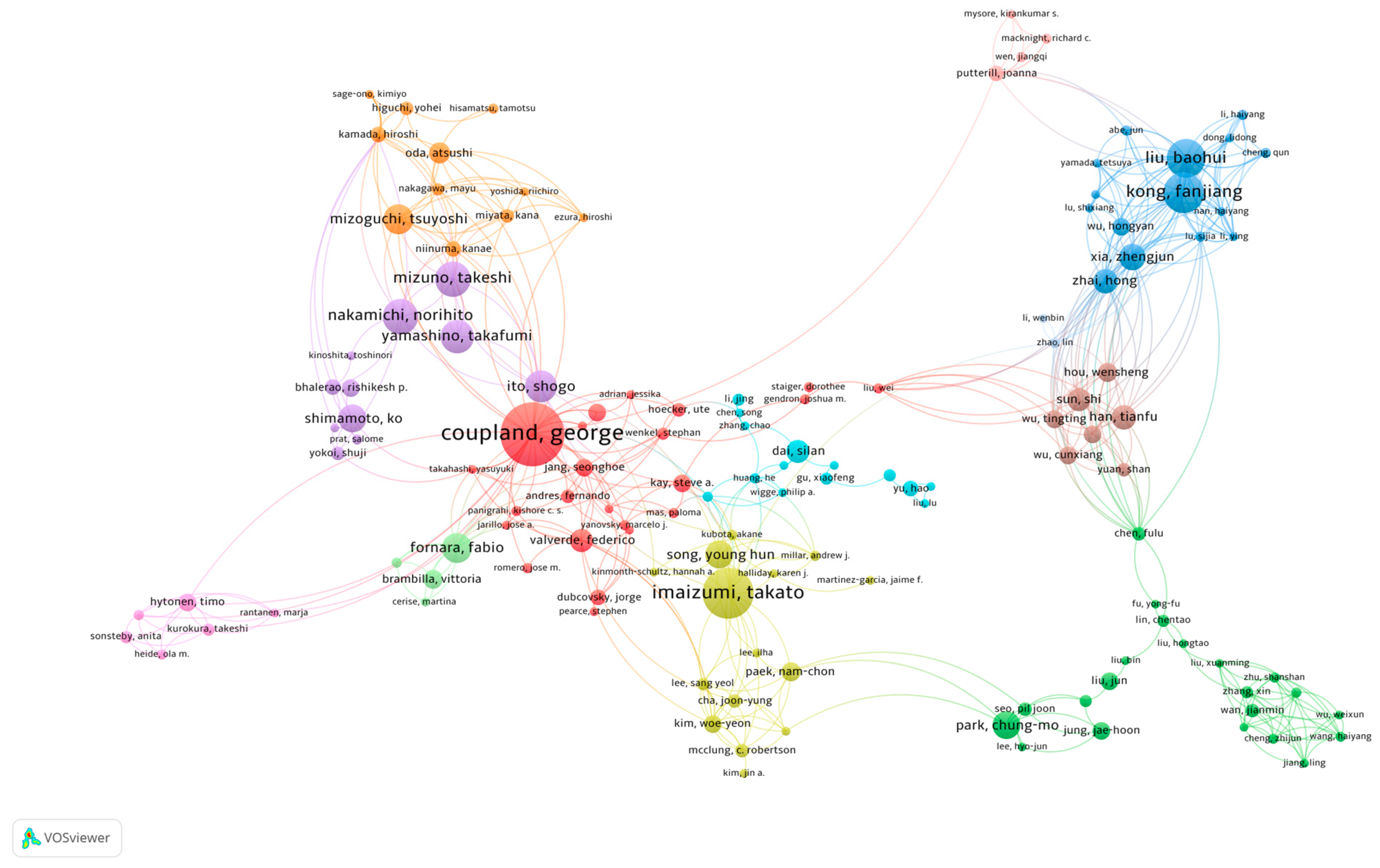
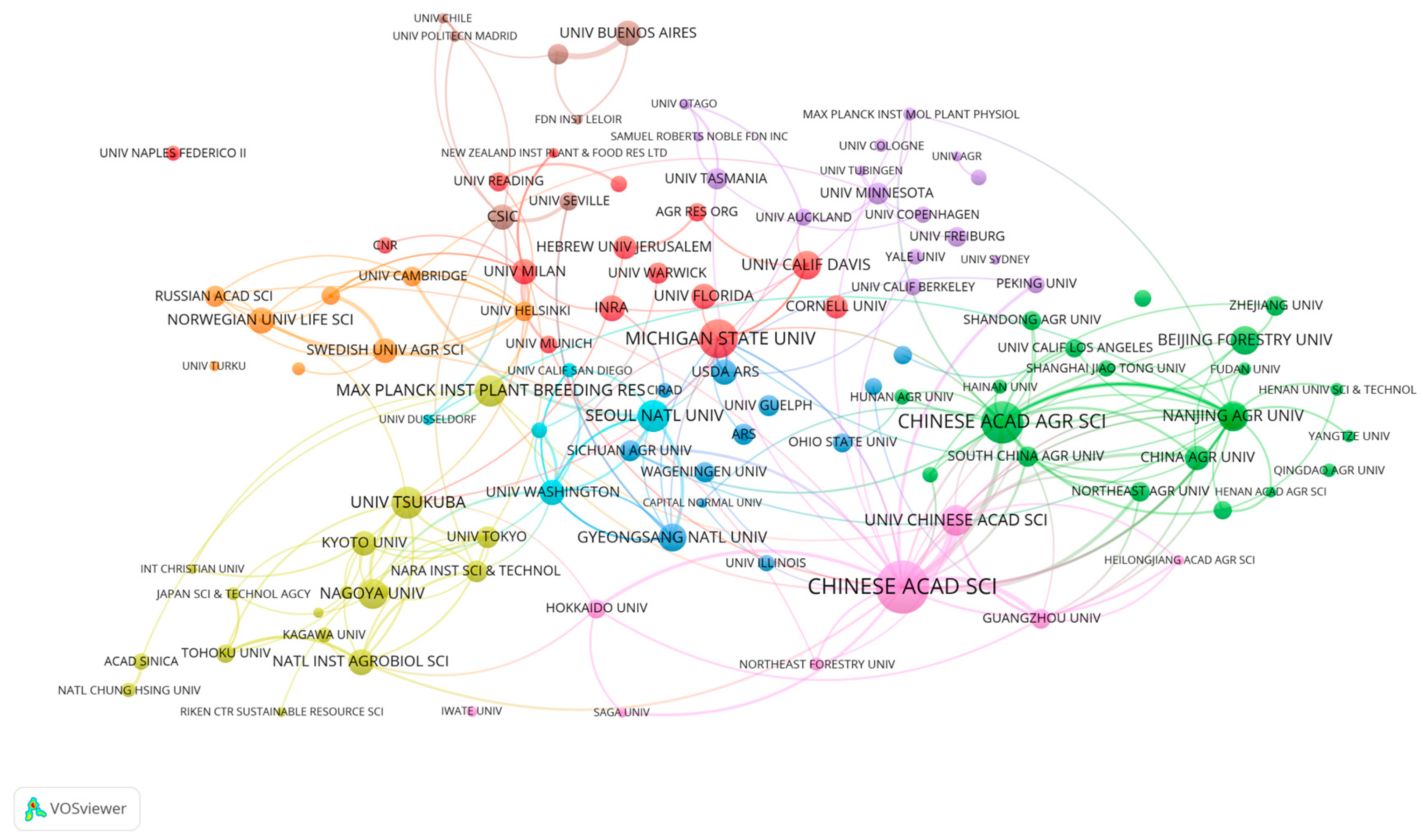
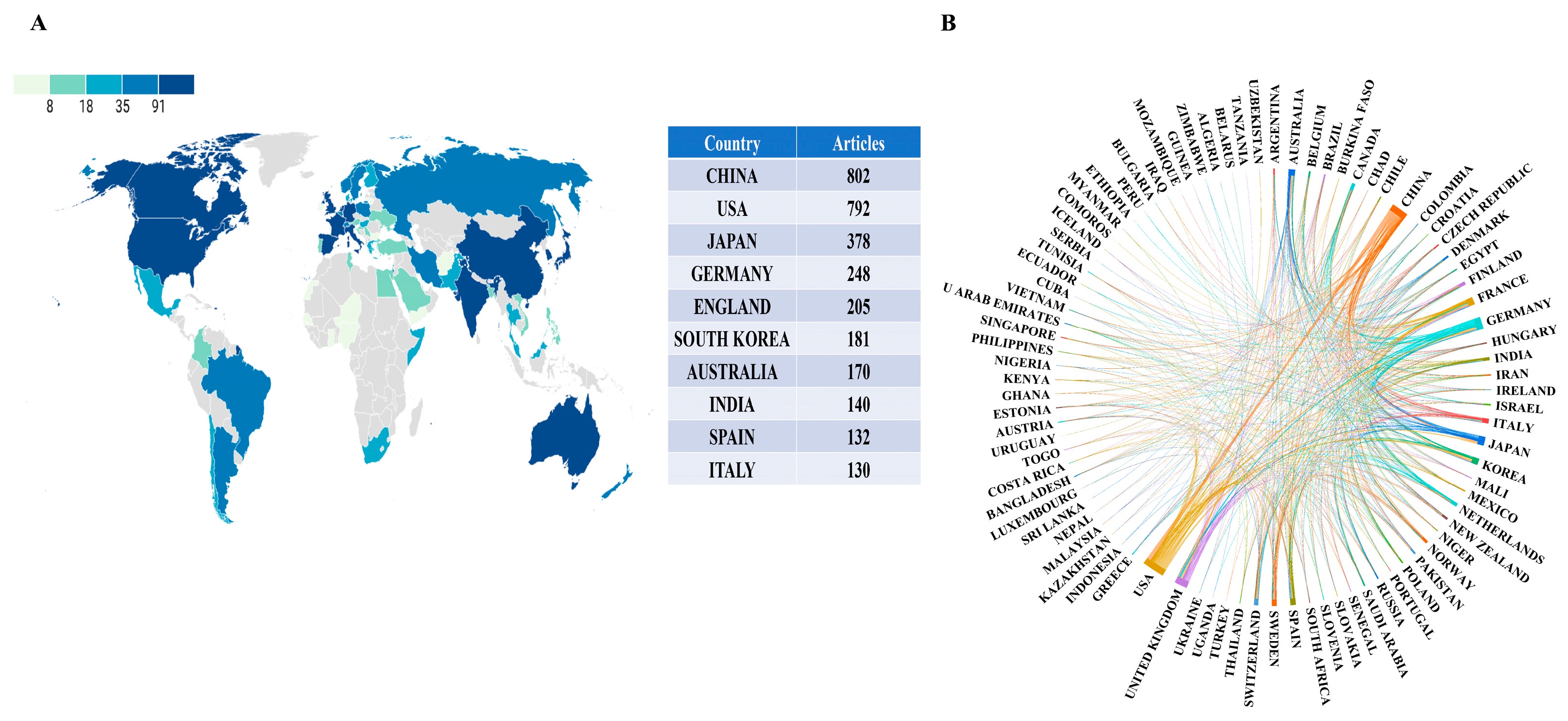
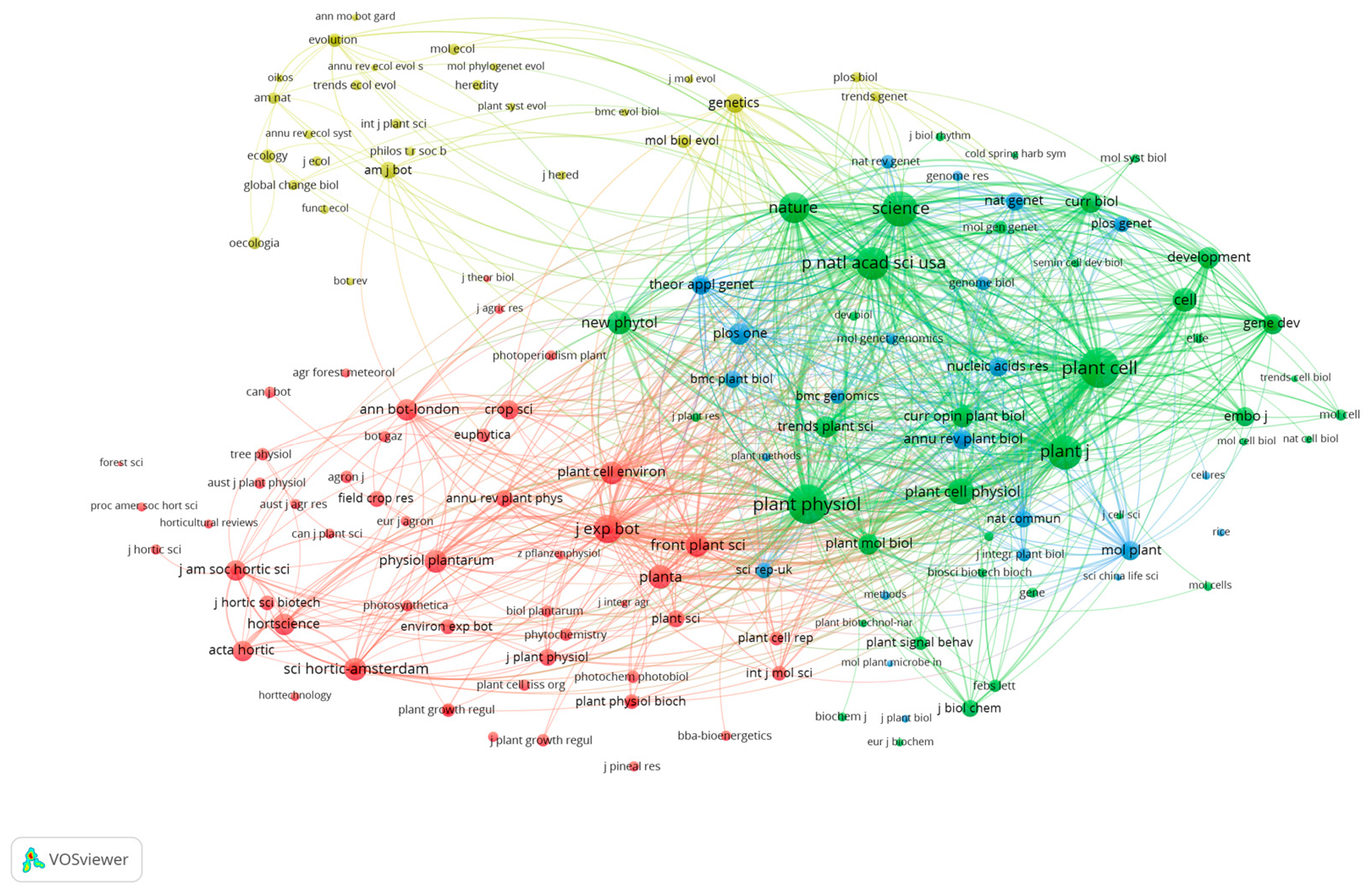

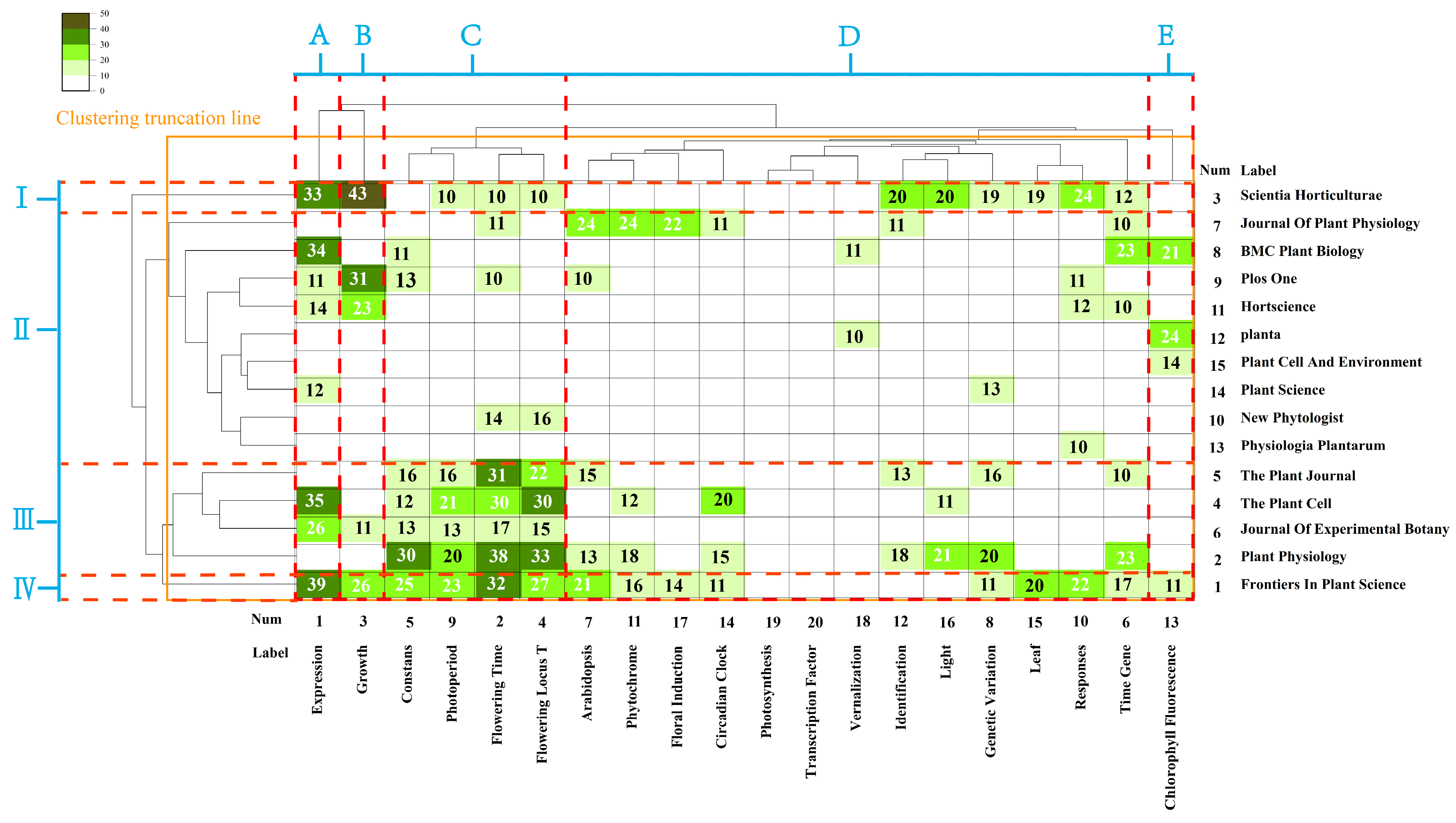
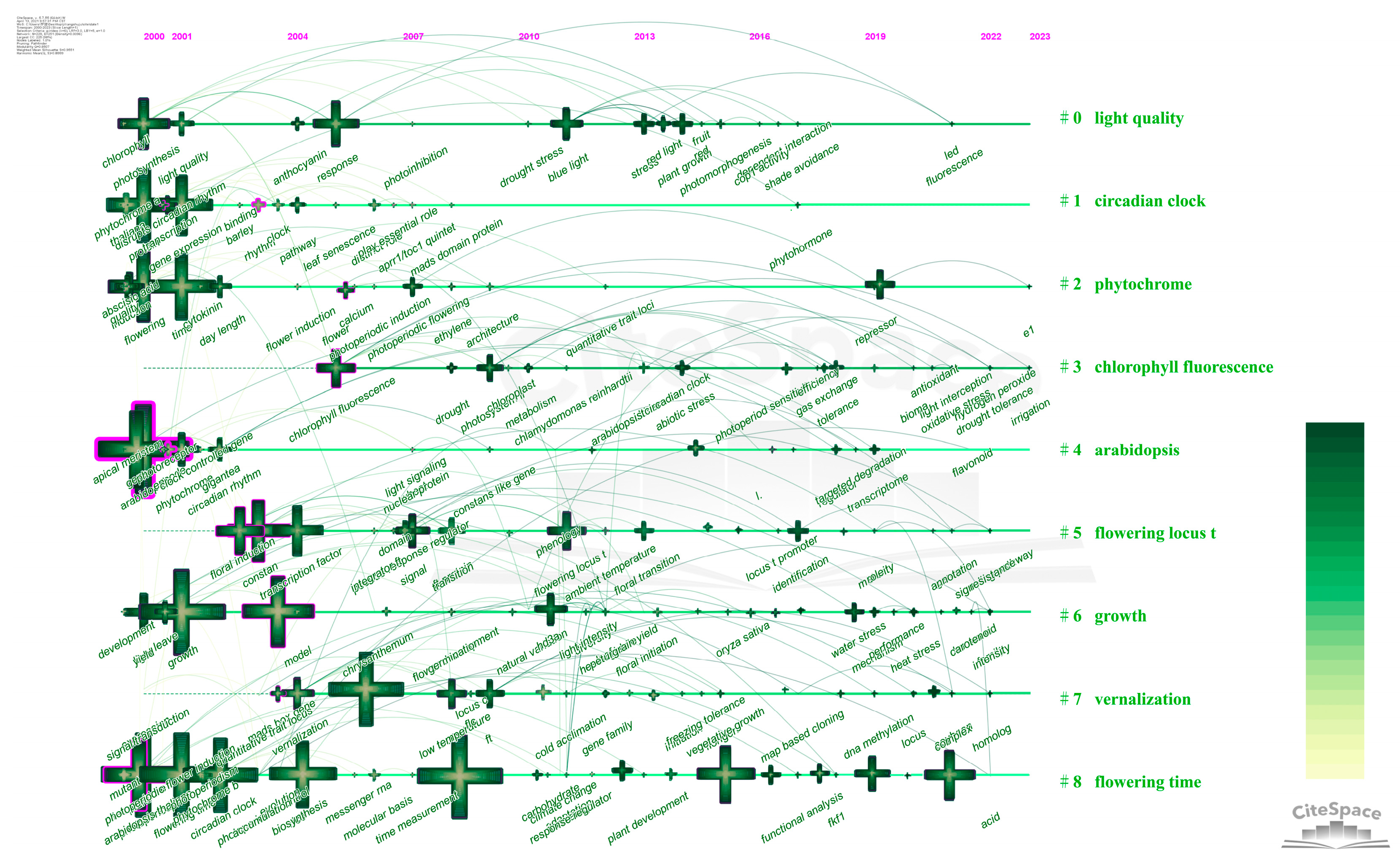
| Rank | Institution | Country | TP a | P b | TLS c | CPP d | H e |
|---|---|---|---|---|---|---|---|
| 1 | Chinese Academy of Sciences | China | 152 | 3.88% | 221 | 34.38 | 38 |
| 2 | Chinese Academy of Agricultural Sciences | China | 96 | 2.45% | 113 | 35.33 | 33 |
| 3 | Michigan State University | USA | 81 | 2.07% | 27 | 32.03 | 28 |
| 4 | Max Planck Institute for Plant Breeding Research | Germany | 66 | 1.68% | 67 | 139.84 | 50 |
| 5 | Seoul National University | Korea | 55 | 1.40% | 51 | 45.45 | 23 |
| 6 | University of Tsukuba | Japan | 55 | 1.40% | 53 | 31.80 | 18 |
| 7 | University of Chinese Academy of Sciences | China | 51 | 1.30% | 90 | 20.94 | 22 |
| 8 | Nanjing Agricultural University | China | 49 | 1.25% | 46 | 34.38 | 20 |
| 9 | Nagoya University | Japan | 48 | 1.22% | 36 | 56.27 | 24 |
| 10 | University of California Davis | USA | 44 | 1.12% | 43 | 44.20 | 22 |
| Keywords | Strength | Beginning | End | 2000–2023 |
|---|---|---|---|---|
| Arabidopsis | 15.49 | 2000 | 2011 |  |
| Photosynthesis | 15.26 | 2000 | 2009 |  |
| Parbati’s nil | 13.4 | 2000 | 2008 |  |
| Signal transduction | 11.61 | 2000 | 2014 |  |
| Chlorophyll fluorescence | 10.41 | 2005 | 2023 |  |
| Phytochrome | 8.71 | 2000 | 2004 |  |
| Time gene | 7.78 | 2000 | 2007 |  |
| Abiotic stresses | 15.45 | 2001 | 2011 |  |
| Circadian rhythm | 11.35 | 2001 | 2007 |  |
| Photoperiod | 8.63 | 2003 | 2009 |  |
| Molecular basis | 10.48 | 2005 | 2010 |  |
| Ft protein | 15.12 | 2008 | 2012 |  |
| Floral induction | 12.71 | 2008 | 2012 |  |
| Oryza sativa | 8.16 | 2011 | 2017 |  |
| Locus t | 7.7 | 2012 | 2014 |  |
| Plant growth | 11.59 | 2017 | 2023 |  |
| Flowering-time | 8.88 | 2019 | 2023 |  |
| Circadian clock | 8.29 | 2019 | 2023 |  |
| Light quality | 8.57 | 2020 | 2023 |  |
| Soybean | 9.29 | 2021 | 2023 |  |
Disclaimer/Publisher’s Note: The statements, opinions and data contained in all publications are solely those of the individual author(s) and contributor(s) and not of MDPI and/or the editor(s). MDPI and/or the editor(s) disclaim responsibility for any injury to people or property resulting from any ideas, methods, instructions or products referred to in the content. |
© 2024 by the authors. Licensee MDPI, Basel, Switzerland. This article is an open access article distributed under the terms and conditions of the Creative Commons Attribution (CC BY) license (https://creativecommons.org/licenses/by/4.0/).
Share and Cite
Luo, J.; Lv, H.; Shu, Y.; Mei, G.; You, X.; Hou, X. Advances on the Photoperiodic Regulation of Plant Flowering: A Bibliometric Study. Horticulturae 2024, 10, 868. https://doi.org/10.3390/horticulturae10080868
Luo J, Lv H, Shu Y, Mei G, You X, Hou X. Advances on the Photoperiodic Regulation of Plant Flowering: A Bibliometric Study. Horticulturae. 2024; 10(8):868. https://doi.org/10.3390/horticulturae10080868
Chicago/Turabian StyleLuo, Jian, Hengmin Lv, Yiting Shu, Guihu Mei, Xiong You, and Xilin Hou. 2024. "Advances on the Photoperiodic Regulation of Plant Flowering: A Bibliometric Study" Horticulturae 10, no. 8: 868. https://doi.org/10.3390/horticulturae10080868
APA StyleLuo, J., Lv, H., Shu, Y., Mei, G., You, X., & Hou, X. (2024). Advances on the Photoperiodic Regulation of Plant Flowering: A Bibliometric Study. Horticulturae, 10(8), 868. https://doi.org/10.3390/horticulturae10080868







